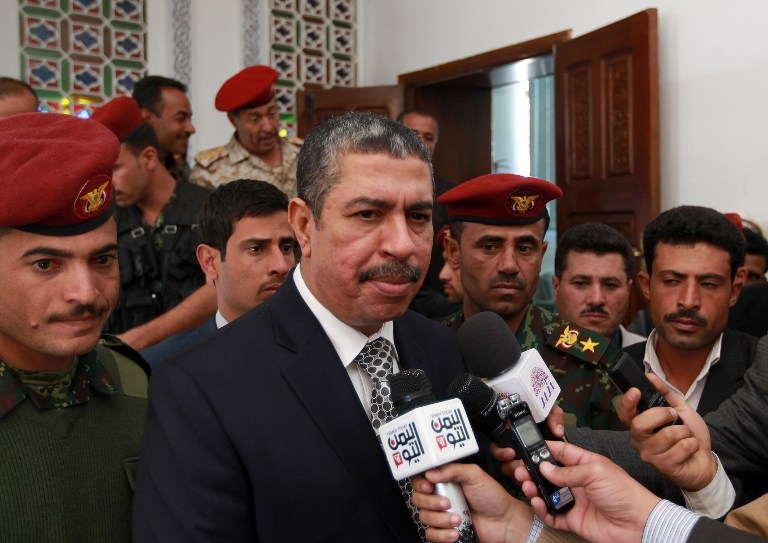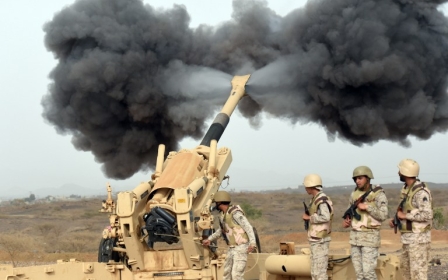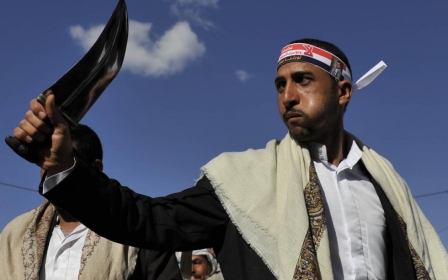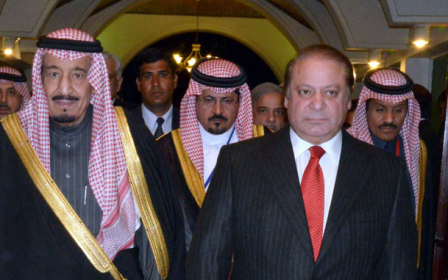No talks with Houthis before 'killings' end, says Yemen's new VP

Yemen's newly appointed vice president, Khaled Bahah, said on Thursday that there would be no dialogue with the Houthis until "killings" stop, particularly in the southern port city of Aden.
Speaking at a press conference in Saudi capital Riyadh, Bahah said his government welcomed all initiatives aimed at resolving the conflict in Yemen.
"But there will be no dialogue [with the Houthis] until the killings in Yemen end," he said in his first press conference since his appointment as vice president last week.
His comments come a day after UN envoy to Yemen, Jamal Benomar, who had been working to bring the country's opposing political factions into dialogue, said he was resigning from his post.
Benomar, who had been in the role for four years, reportedly lost the backing of Gulf countries as well as Yemeni president Abd Rabbuh Mansour Hadi, who said he would no longer participate in Benomar-mediated talks.
Bahah called on the Houthis – along with supporters of former president Ali Abdullah Saleh – to implement all international resolutions related to the Yemen crisis, including the UN Security Council resolution adopted on Tuesday.
The UN resolution imposes an arms embargo on the Houthis and demands they pull back from territory they have captured.
Houthis should 'halt the deliberate killing of civilians'
The resolution also imposes a global asset freeze and travel ban against Ahmed Saleh, son of former president Saleh, and top Houthi militia leader Abdul Malik al-Houthi.
"Our message to the Yemeni people is to give priority to reason and dialogue and stand united behind our project for a civil state," Bahah asserted.
"But this requires the Houthis to implement all international resolutions [related to the Yemen conflict] and halt the deliberate killing of civilians," he added.
The Houthis dismissed the UN resolution on Wednesday with senior Houthi member Mohamed al-Bukhaiti saying "nothing good can come of the Security Council.
"Council resolutions are never based on ethical or logical considerations," Bukhaiti said.
Instead, he said, the UN should have issued a resolution suspending what he called "aggression" against Yemen.
Following Bahah's appointment as vice president this week - which a weakened Hadi was forced to make, sources told MEE's David Hearst - a Yemeni official who requested anonymity told Anadolu Agency that he will "boost the confidence of Yemeni people in their legitimate leadership."
"Bahah enjoys consensus among Yemenis and is neither rejected by the Houthis nor by their allied [ousted president] Saleh," the official said.
The Houthis placed Hadi and Bahah under house arrest in Sanaa when they overran the capital in September and tightened their grip on power after the two leaders tendered their resignations in January.
But while Hadi escaped in February to resurface in Aden, Bahah reached a deal with the Houthis to end his house arrest in March and left for Hadramawt after the Houthis reportedly issued a formal apology to him.
Bahah appealed on Thursday for renegade army units to drop their support for the Houthi militia fighting his exiled government.
"I call on all troops and security forces personnel to accept the command of the legitimate government and protect the country," he told reporters in Riyadh.
Troops loyal to former president Ali Abdullah Saleh have allied with the Huthi rebels fighting pro-Hadi forces.
'Hoping that there is no ground campaign'
A coalition led by Saudi Arabia began an air war on 26 March 26 against the Houthi militiamen who are in control of the Yemeni capital and locked in battle with pro-Hadi forces in the main southern city of Aden.
The coalition has not ruled out sending ground troops but Bahah said he would prefer that didn't happen.
"We are still hoping that there is no ground campaign" to avoid a higher casualty toll, he said, adding the "Yemenis themselves" should be able to handle ground combat in conjunction with coalition air strikes.
The World Health Organization says at least 736 people died in the conflict up to 12 April.
Bahah said his country has suffered six decades of divisions based on loyalties to tribes and individuals.
"We are paying the price of this kind of loyalty," he said, calling on Yemenis, especially the military, to put their country first.
The poverty which ravages Yemen is another factor behind the violence, he said.
Bahah said the restoration of the vice presidency aims to "improve the efficiency, the capacity, of the presidency. President Hadi passed through a very difficult time".
Saudi: air strikes 'very successful'
Meanwhile, Saudi Arabia's ambassador to the United States said on Wednesday that the air campaign against Houthi militia has been "very successful" and gone "beyond its goals."
In the past three weeks, the campaign "has been able to degrade and destroy much of the military infrastructure that Houthi militia and (former president Ali Abdullah) Saleh possess," said ambassador Adel al-Jubeir.
He told reporters in Washington that "we are also beginning to see cracks" in the Huthi and Saleh military ranks and "we see military commanders defecting back to the regular Yemeni military."
"We expect to see more and more of them as pressure intensifies," he said, adding "this operation will continue until objectives are achieved. There can be no half measures."
The Houthi militiamen have allied with troops loyal to Saleh, who was forced from power in 2012 following a year of nationwide protests against his three-decade rule.
But Jubeir said deliveries of arms to the Houthi militia from Iran appeared to have stopped since the start of the intensive air strikes.
"We have control over the air and inspection of ships. We are not aware of Iranian shipments of weapons to the Houthis," he said.
'No reason for Iran to be involved with Yemen'
And he also demanded that Iran stop interfering in Yemen, saying the two countries did not share a border.
"There is no reason for Iran to be involved with Yemen. There is no reason for Iran to be supporting one faction against the other," Jubeir said.
"The Iranians should be supporting all Yemenis. That's how we bring about stability and security and safety."
Local Yemeni defense committees backed by Saudi Arabia were also beginning to have success, and had managed to wrest back a large part of Aden as well as other parts of the country.
The coalition had been "careful in targeting military targets and minimising civilian damages," Jubeir added.
Al-Qaeda seizes airport in Mukalla
Meanwhile, al-Qaeda militants on Thursday seized a provincial airport in southeast Yemen while tribal forces took over an oil terminal.
"The military unit in charge of security at the facility withdrew without resisting" al-Qaeda fighters, said an official at the airport in Mukalla, capital of Hadramawt province.
Al-Qaeda in the Arabian Peninsula, the militant network's powerful Yemeni branch, earlier this month took advantage of the growing chaos to overrun Mukalla.
Military sources said AQAP now controls the whole of the city of more than 200,000 inhabitants, except for a camp of soldiers loyal to President Hadi.
Elsewhere in Hadramawt province, tribal forces on Thursday took control of a major oil terminal after soldiers protecting the site withdrew, a military source said.
The terminal, in the city of Al-Shihr, "fell under the complete control of tribal fighters after the military unit guarding it withdrew in the afternoon without resistance," the source told AFP.
In southwest Yemen, militiamen loyal to Saleh traded tank and artillery fire on Thursday with a pro-Hadi brigade in the city of Taiz, military sources and witnesses said.
New MEE newsletter: Jerusalem Dispatch
Sign up to get the latest insights and analysis on Israel-Palestine, alongside Turkey Unpacked and other MEE newsletters
Middle East Eye delivers independent and unrivalled coverage and analysis of the Middle East, North Africa and beyond. To learn more about republishing this content and the associated fees, please fill out this form. More about MEE can be found here.




